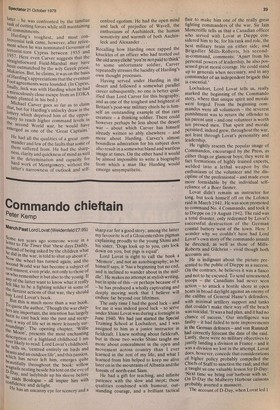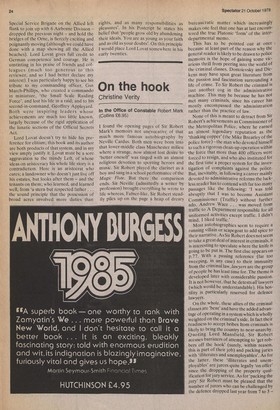Commando chieftain
Peter Kemp
March Past Lord Lovat (Weidenfeld £7.95) _Some ten 3rears ago someone wrote in a tetter to The Times that 'these days Daddy, Instead of being asked by the children what ne did in the war, is told to shut up about it. OW the wheel has turned again, and the second World war has become a subject of real interest, even pride, not only to those of us who remember it but also to the young. If any of the latter want to know what it really telt like to be a fighting soldier in some of the fiercest actions of that war, they should buy Lord Lovat's book. But this is much more than a war book. To quote the author, 'Though the war chapLters are important, the intention has largely 'en to cast back into the past and recapture a way of life set in more leisurely surtroundings'. The opening chapter, jle Moon', presents the most enchanting uescription of a highland childhood I am ever likely to read. Lord Lovat's childhood, he tells us, 'centred entirely on birds and beasts and an outdoor life', and this passion, hich has never left him, emerges quite beautifully throughout the book: willow Wagtails nesting beside his tent on the eve of -DaY, and ladybirds up his sleeve before ue raids Boulogne — all inspire him with confidence and delight. He has an uncanny eye for scenery and a sharp ear for a good story; among the latter my favourite is of a Gloucestershire pigman explaining proudly to the young Shimi and his sister, 'Dogs look up to you, cats look down on you, but pigs is equal'. Lord Lovat is right to call the book a 'Memoir', and not an autobiography; as he himself says, it 'has a beginning but no end, and is inclined to wander about in the middle'. He makes no attempt at stylish writing, but in spite of this perhaps because of it — he has produced a wholly captivating and deeply moving work that I believe will endure far beyond our lifetimes. The only time I had the good luck — and for me it was indeed good luck — to serve under Shimi Lovat was during a fortnight in June 1940. We had just started the Special Training School at Lochailort, and I was assigned to him as a junior instructor in fieldcraft. I knew nothing about fieldcraft, but in those two weeks Shimi taught me more about concealment in the open and movement across country than I ever learned in the rest of my fife; and what I learned from him helped to keep me alive later on in the mountains of Albania and the forests of north-east Siam.
He had a gift for teaching, and infinite patience with the slow and inept; those qualities combined with humour, outstanding courage, and a brilliant tactical flair to make him one of the really great fighting commanders of the war. Sir lain Moncreiffe tells us that a Canadian officer who served with Lovat at Dieppe considered him to be, for his rank and role, the best military brain on either side; and Brigadier Mills-Roberts, his secondin-command, comments: 'Apart from his personal powers of leadership, he also possessed great moral courage. He could stand up to generals when necessary, and in any commander of an independent brigade this is essential.'
Lochailort, Lord Lovat tells us, really marked the beginning of the Commando story, where that unique spirit and morale were forged. From the beginning commandos were all volunteers — the severest punishment was to return the offender to his parent unit — and one volunteer is worth ten pressed men. That spirit and morale persisted, indeed grew, throughout the war, not least through Lovat's personality and leadership.
He rightly resents the popular image of Commandos, encouraged by the Press, as either thugs or glamour boys; they were in fact formations of highly trained experts, welded into a lethal weapon by the enthusiasm of the volunteer and the discipline of the professional — and made even more formidable by the individual selfreliance of a Boer farmer.
Lovat didn't remain an instructor for long, but took himself off on the Lofoten raid in March 1941. He was soon promoted to command No. 4 Commando, and took it to Dieppe on 19 August 1942. The raid was a total disaster, only redeemed by Lovat's successful destruction of the German coastal battery west of the town. Here I wonder why we couldn't have had Lord Lovat's own story of the commando assault he directed, as well as those of MillsRoberts and Gilchrist — vivid though both accounts are.
He is indignant about the picture presented to the public of Dieppe as a success. On the contrary, he believes it was a fiasco and not to be excused. To send unseasoned.
troops — the Canadians had never seen action — to attack a hostile shore in open boats in broad daylight against an enemy of the calibre of General Haase's defenders, with minimal artillery support and tanks that couldn't make their way off the beach was suicidal. 'It was a bad plan, and it had no chance of success.' Our intelligence was faulty — it had failed to note improvements in the German defences — and von Runstedt had correctly forecast the date of the raid. Lastly, there were no military objectives to justify landing a division in France — and it was a division we lost in the attempt. Lovat does, however, concede that considerations of higher policy probably compelled the Chiefs of Staff to sanction the raid; and that it taught us one valuable lesson for D-Day: 'Next time we bring our harbour with us.' On D-Day the Mulberry Harbour caissons probably averted a massacre.
The account of D-Day, when Lovat led 1 Special Service Brigade on the Allied left flank to join up with 6 Airborne Division — dropped the previous night — and hold the bridges of the Orne, is fiercely exciting and poignantly moving (although we could have done with a map showing all the Allied beaches). Lord Lovat gives full credit to German competence and courage. He is unstinting in his praise of friends and colleagues (much too generous to this reviewer, and so I had better declare my interest). I was particularly happy to see his tribute to ray commanding officer, Gus March-Phillips, who created a commando in miniature, 'the Small Scale Raiding Force', and lost his life in a raid; and to his second-in-command, Geoffrey Appleyard. Both were inspiring leaders whose achievements are much too little known, largely because of the rigid application of the lunatic sections of the Official Secrets Act.
Lord Lovat doesn't try to • hide his preference for elitism; this book and its author are both products of that system, and in my view amply justify it. Lovat must be a sore aggravation to the trendy Left, of whose ideas on aristocracy his whole life story is a contradiction. Here is an aristocrat who cares; a landowner who doesn't just live off his estates, but looks after them — and the tenants on them; who learned, and learned well, from 'a stern but respected father . the sound principle that the possession of broad acres involved more duties than rights, and as many responsibilities as pleasures'. In his Postcript he states his belief that 'people grow old by abandoning their ideals. You are as young as your faith and as old as your doubts'. On this principle I would place Lord Lovat somewhere in his early twenties.







































 Previous page
Previous page